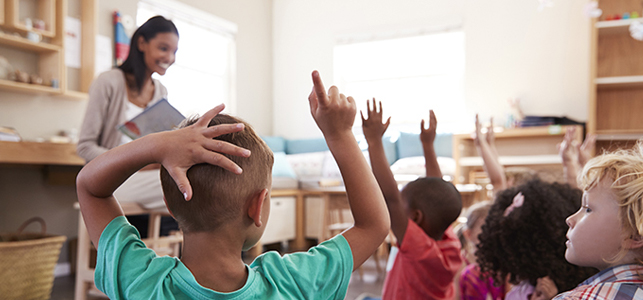
Children are screened for hearing loss at birth, but hearing loss and hearing problems can also develop during childhood. Sometimes it’s temporary – like ear infections – but other times it’s permanent, and it can be nearly impossible to tell the difference without the proper testing.
Hearing testing
As they age, children often get routine hearing screenings in the pediatrician’s office or at school, but any parent who has concerns about hearing or whose child has failed a hearing screening can ask for a referral to audiology for testing. Children with ear infections, allergies or other health problems may first be referred to a specialist physician like an ear, nose and throat doctor, allergist or a neurologist who will work with audiologists for hearing testing.
What to watch for
Parents often think they will be able to easily tell if their child can’t hear or is having a hearing issue, but hearing is not “all or nothing.” A child may respond to noise by startling or turning their head, but that doesn’t mean they have normal hearing. In fact, most children with hearing loss can hear some sounds, but still not hear enough to develop typical speech and language skills. Also, though it is considered more of an issue for a much older age group, an individual of any age – children included – can have hearing loss or a hearing issue where they can hear people talking, but can’t understand them.
Young children – Since speech and language development does have a normal range, some children will naturally develop these skills more slowly than others. However, if a child only develops their speech/language skills to a certain level and never progresses, is difficult to understand or is frustrated at not being able to communicate, it’s always worth having their hearing checked.
School-age children – Any child who seems to be struggling in school should have a hearing screening, even if the child has passed earlier hearing testing. Speech, attention and behavior problems – all of which are often more easily recognized in the school setting – may be signs of hearing issues.
The start of a new school year is a time that hearing loss/issues may be more noticeable. When kids begin a new grade, their speech and language differences and lack of attention are more obvious than they may have been the previous school year or during summer vacation. Each school year brings greater challenges as more is expected in class. Language gets more complex and teachers may notice that a child is falling behind, not responding or misunderstanding what’s being said. These behaviors may be misinterpreted as a lack of attention, when in fact they are signaling a hearing problem. Children with fluctuating hearing due to temporary medical problems may respond inconsistently, and behavior problems can develop. With slowly decreasing hearing (which can be hard to detect) a child probably will develop some language but may have what appears to be an articulation problem (inability to form speech sounds) or learning challenges.
Early detection matters – don’t delay
Early detection is important for developmental reasons. Children can only say what they hear, so a child with hearing problems is likely to develop speech and language delays and also possibly learning delays. Studies do show that children born with hearing loss or experiencing fluctuating or decreasing hearing who get appropriate services at a young age are usually able to develop language and learning skills on par with those of their hearing peers. Knowing what to watch for and how to access help is important with hearing loss. Keep a close eye on speech development and behavior and don’t delay seeking help if you have any concerns.
Hearing services in Virginia
Families in Virginia have several resources available to them:
-The Virginia Early Hearing Detection and Intervention (EHDI) program follows up with families of all newborns in the state to make sure that they are screened for hearing loss.
-If a baby doesn’t have any risk factors for hearing loss and has passed the newborn screening test, then their pediatrician will assess the baby’s hearing and speech/language development at each of the regular visits. A child who is at risk for hearing loss (family history of deafness, medical condition associated with hearing loss like cleft palate or cytomegalovirus [CMV], etc.) will be followed by an audiologist as well.
-In addition, the Individuals with Disabilities Education Act (IDEA) requires that free early intervention programs be offered to babies and children with hearing loss, beginning at the time the child’s hearing loss is identified. Once a child turns 3, they transition to school-based services for intervention. IDEA covers children until high school graduation or age 21.
Dr. Christine Eubanks, director of audiology
Children with varied degrees of hearing loss are living healthy, normal lives with the help of CHoR’s highly trained audiologists. Our pediatric audiologists evaluate the hearing and listening skills of infants through teens and provide customized treatment plans, guidance and care recommendations.
